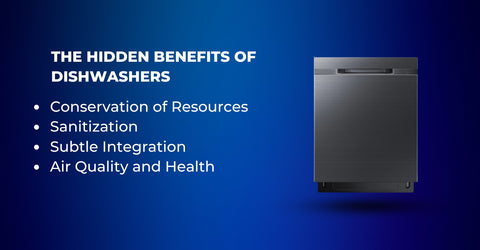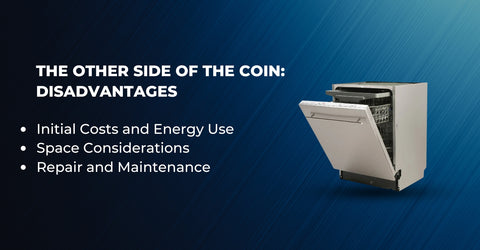Whether you prefer home cooking or convenience meals, one universal kitchen truth remains: dishes must be washed! Washing can be tedious work that, no matter your mindfulness levels, you likely prefer to do something other than each day; dishwashers present an appealing solution; however, are they worth their investment? Lucky White Goods explores their potential upsides and downsides to provide insights beyond typical discussions.
Understanding How Dishwashers Work
It sprays hot water onto the dirty dishes, typically between 130 and 170 degrees Fahrenheit. Water mixed with detergent is pumped through rotating spray arms, efficiently removing food and grease by hitting the dishes from various angles. After the wash cycle, the water drains away, and a drying cycle kicks in, using heated air or a fan to dry the dishes completely.
The Hidden Benefits of Dishwashers

-
Conservation of Resources: In Australia, water-efficient dishwashers (4-star WELS rating or higher) can significantly reduce water use compared to handwashing. They use around 1 litre per place setting, saving up to 19,000 liters annually. You can conserve water and lower utility bills with eco settings and full loads.
-
Sanitization: Dishwashers have one key advantage that hand washing cannot: sanitation. Utilizing temperatures up to 145degF, dishwashers effectively remove germs and bacteria. This feature alone may justify the investment in homes with young children or during flu seasons.
-
Subtle Integration: Unfortunately, few articles focus on modern dishwashers' subtle yet aesthetic integration into kitchen designs. Panel-ready models can be fitted with custom panels that complement cabinetry for an attractive yet practical result that enhances kitchen aesthetics and provides practical benefits.
- Air Quality and Health: One lesser-known advantage of dishwashers is their potential impact on indoor air quality and health. By decreasing moisture levels in your kitchen, dishwashers help prevent mold growth in sink basins that accumulate water for too long.
The other side of the coin: Disadvantages

-
Initial Costs and Energy Use: Although dishwashers save water and can be energy efficient, their initial investment can still be considerable. Energy-efficient models may save money over time but often come at a steeper upfront cost; their environmental footprint might still be substantial depending on where your power comes from.
-
Space Considerations: In smaller kitchens, the space requirements of a dishwasher could become an enormous hindrance. A permanent spot must be found in compact urban apartments where space may be at a premium.
- Repair and Maintenance: Dishwashers are complex machines; repairing them can be expensive and inconvenient. Over their lifespan of 10 years, costs associated with parts and labor may increase over time, particularly with higher-end models.
Is a Dishwasher Right for You?
Deciding if a dishwasher is suitable for you depends on your lifestyle. Large families or frequent entertainers will appreciate how time-saving a dishwasher can be, but smaller households or those conscious of energy use may find the benefits outweigh the costs. Lucky White Goods provides affordable dishwasher options to meet various needs and budgets - energy efficiency or compact designs- and we have solutions that streamline chores while fitting seamlessly into kitchen spaces.
Conclusion
Determining whether dishwashers are worth investing in ultimately lies within each need and value. While dishwashers provide undeniable advantages such as water conservation, hygiene improvement, and time savings, as well as cost considerations like space usage and energy consumption, choosing one to meet both household requirements and environmental concerns will maximize what modern dishwashing technology offers. Lucky White Goods can assist you with this decision process with product insights and personalized advice to ensure you find appliances tailored to fit your lifestyle needs!
Frequently Asked Questions:
Are All Dishwashers the Same Size?
No. Dishwashers come in various sizes to meet varying kitchen spaces and user needs. Standard dimensions typically span 24 inches wide, while compact models may measure as narrow as 18 inches in width. Depending on individual installations or capacity needs, larger or smaller options may also be available.
When do dishwashers go on sale?
Dishwashers often appear for sale during major shopping events like Black Friday or any special occasion, as well as holiday and clearance sales, with discounts from retailers both online and in-store allowing shoppers to find a fantastic deal on a dishwasher.
Is it better to use a dishwasher or not?
Dishwashers can often be more efficient than handwashing, saving time, water resources, and energy usage. Their convenience for busy households makes them ideal. Furthermore, modern dishwashers are designed with eco-friendliness to lessen environmental impact further.
Where to buy cheap dishwashers?
Are you looking for budget-friendly dishwasher options? For an impressive selection, Lucky White Goods may have you covered. As one of the leading providers of factory second appliances, we offer discounted pricing on fully functional models with minor cosmetic flaws - meaning more savings for you.
How much do dishwashers cost?
Dishwasher prices depend on brand, model, features, and retailer factors. Entry-level models typically start at around $350, while high-end models with advanced features may cost over $1,000. Consider both your budget and needs when making this critical purchase decision.

